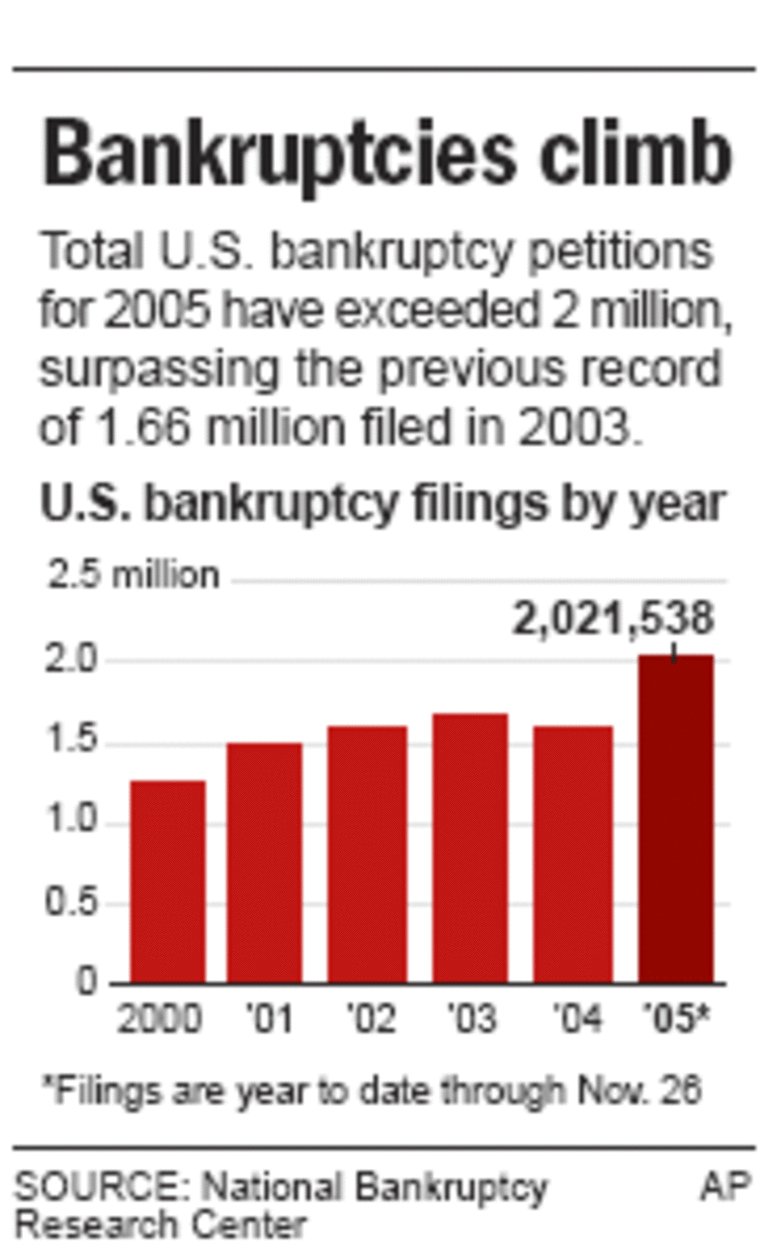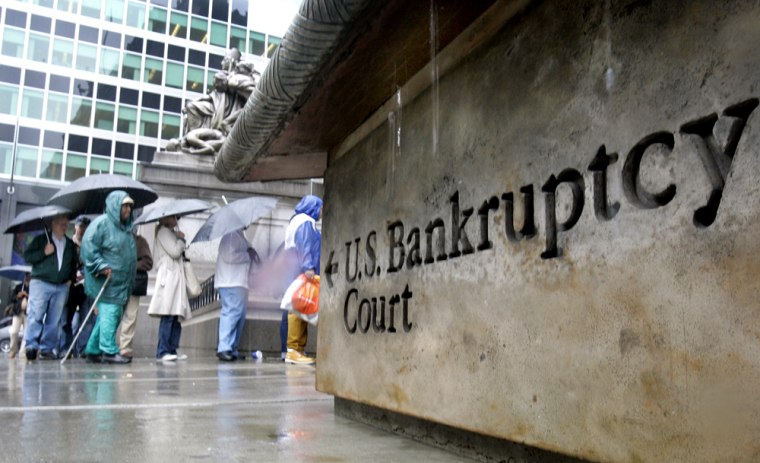The dropoff in consumer bankruptcy petitions since the nation's bankruptcy law changed belies the fact that there are still many Americans in serious financial trouble.
Bankruptcy filings peaked at a record of more than 315,000 a week before the law took effect Oct. 17 but have since fallen to a weekly rate of about 3,500, according to Lundquist Consulting Inc., a financial information and consulting firm based in Burlingame, Calif.
"As far as what's happening in the (bankruptcy) courts, it's like the snake that swallowed the rat," said Texas attorney John Penn, who is president of the American Bankruptcy Institute in Washington, D.C. "It's going to take a while to digest, but the system will go on."
But Penn and other experts don't expect filings to remain so low.
"We have not changed either the laws of economics or basic human nature," Penn said.
Financially troubled consumers rushed to file before Oct. 17 because the new law is expected to force more debtors into Chapter 13 bankruptcy programs, which require them to pay creditors on a court-approved schedule, rather than into Chapter 7, which discharged most of their unsecured debts. Before the change, nearly three-quarters of the consumer cases were Chapter 7.

The rules also require much more paperwork, including tax forms and certified income statements, as well as mandatory credit counseling in advance of filing.
Still, because of the fall filing rush, total bankruptcy petitions this year already exceed 2 million, surpassing the previous record of 1.66 million filed in 2003. Last year, just under 1.6 million petitions were filed.
Are levels of 1.6 million and higher now history? Experts don't think that's necessarily the case.
David A. Greer, a bankruptcy attorney in Norfolk, Va., who is vice chairman of the consumer bankruptcy committee of the American Bar Association's business law section, said many Americans continue to have debt problems that can tip them into bankruptcy.
"I think probably it is not going to be as dramatic a falloff as you might think," Greer said. "People will still file, regardless of the difficult requirements."
Greer said the first clues to future bankruptcy filing levels are likely to come after the holidays.
"Christmas spending catches up, and creditors — who generally relax through December and the holiday season — then put the pressure back on," he said.
In addition, families devastated by the hurricanes that hit Florida and the Gulf Coast this year also may have used up emergency resources by spring and be forced into bankruptcy, experts said.
Credit counselors weren't involved in the process until the law change made it mandatory for consumers to consult these nonprofit agencies within 180 days of filing their bankruptcy applications. The law also mandates that many complete a financial education course before their bankruptcies are final.
Suzanne Boas, president of the Consumer Credit Counseling Service of Atlanta, said her group has been seeing a large number of people in its new bankruptcy counseling program. The CCCS of Atlanta is one of dozens of nonprofit agencies approved to counsel bankruptcy petitioners by the Justice Department's Executive Office for U.S. Trustees.
"We've seen a 50 percent increase in (phone) calls and a 100 percent increase in Web traffic" since the new bankruptcy law was enacted, Boas said.
Many of the new clients have been referred by bankruptcy attorneys, who are on the front line in informing would-be filers of the counseling requirement, she said.
"We take them through an orderly review of their situation, help them understand what they're taking in, what they're spending," Boas said. "Then we show them our ideas about how they might be able to save money going forward — how to change that expense picture or, in some cases, how they could increase income."
Although such budget advice could lead some consumers to reconsider bankruptcy, most of the people CCCS of Atlanta has dealt with so far "are too late in the financial distress cycle" to avoid filing for debt relief, she said.
Michael Dean, a managing director at Fitch Ratings service in New York, said the spike in bankruptcy filings has raised the number of charge-offs of debt by credit card issuers in recent weeks.
Going forward, he said, some debtors may hesitate to file for bankruptcy to avoid the tougher requirements, "but we think that universe is rather small," Dean said.
At the same time, he won't be surprised if credit card issuers and other lenders have to deal with more borrowers who are struggling and may seek concessions as they work through their debts.
